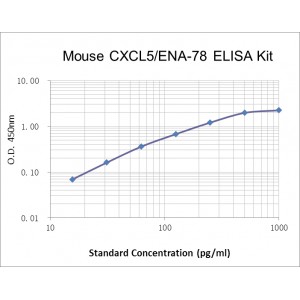More info
Assay Range | 15.6-1,000 pg/mL |
Sensitivity | 10.0 pg/mL |
Size | 96T |
Storage | Store at 2 - 8ºC. Keep reconstituted standard and detection Ab at -20 ºC |
Assay Principle | Sandwich ELISA |
Sample Volume | 100 µL final volume, dilution factor varies on samples |
Detection Method | Chromogenic |
Kit Components
1. Recombinant Mouse CXCL5 standard: 2 vials
2. One 96-well plate coated with anti-Mouse CXCL5 Ab
3. Sample diluent buffer: 12 mL - 1
4. Detection antibody: 130 µL, dilution 1:100
5. Streptavidin-HRP: 130 µL, dilution 1:100
6. Antibody diluent buffer: 12 mL x1
7. Streptavidin-HRP diluent buffer: 12 mL x1
8. TMB developing agent: 10 mL x1
9. Stop solution: 10 mL x1
10. Washing solution (20x): 25 mL x1
Background
CXCL5 (C-X-C motif chemokine 5), also known as epithelial-derived neutrophil-activating peptide 78 (ENA-78), is a small cytokine belonging to the CXC chemokine family. The 78 amino acid (aa) mature CXCL5 protein is generated from the full-length 114aa CXCL5 precursor protein by removing the 36 aa signal peptide from its N-terminus. CXCL5 shares significant sequence identity with GROα (52%), GROβ (48%), GROγ (51%), IL-8 (22%) and NAP-2 (53%). CXCL5 is also highly homologous to other CXC cytokines such as CXCL4 CXCL6, CXCL7 and CXCL8.
CXCL5 plays an important role in inducing chemotaxis and activation of neutrophils by binding to the cell surface receptor CXCR2 and mediating the downstream signaling pathways. Inducible expression of CXCL5 has been observed in neutrophils, monocytes/macrophages, endothelial cells, vascular smooth muscle cells, epithelial cells and pulmonary fibroblasts following various inflammatory stimuli. Clinically, high levels of CXCL5 have been linked with prostate, gastric and pancreatic cancer progression. Increased ENA-78 expression has also been found to be associated with neutrophil influx in various inflammatory conditions.


